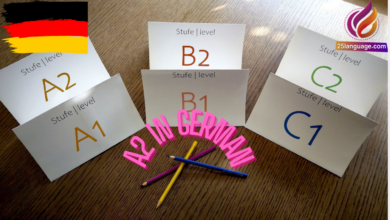Subordinate Clauses in German

Subordinate Clauses in German.Subordinate clauses in German, known as “Nebensätze,” are clauses that cannot stand alone as complete sentences and are dependent on a main clause. They often provide additional information about time, reason, condition, contrast, or manner. Here are some examples of subordinate clauses in German, along with their English translations:
- Temporal (Time-Related) Subordinate Clause
- German: Ich gehe ins Bett, nachdem ich ein Buch gelesen habe.
- English: I go to bed after I have read a book.
- Kausal (Cause and Effect) Subordinate Clause
- German: Er kann nicht kommen, weil er krank ist.
- English: He cannot come because he is sick.
- Konditional (Conditional) Subordinate Clause
- German: Wenn es regnet, bleiben wir zu Hause.
- English: If it rains, we will stay at home.
- Konsekutiv (Result) Subordinate Clause
- German: Er spricht so leise, dass ich ihn nicht hören kann.
- English: He speaks so softly that I cannot hear him.
- Final (Purpose) Subordinate Clause
- German: Wir lernen Deutsch, damit wir in Deutschland arbeiten können.
- English: We learn German so that we can work in Germany.
- Konjunktiv (Conjunctive) Subordinate Clause
- German: Obwohl es kalt ist, gehe ich joggen.
- English: Although it is cold, I go jogging.
- Relativsatz (Relative Clause)
- German: Das ist der Mann, der mir geholfen hat.
- English: That is the man who helped me.
These examples show how subordinate clauses in German provide additional information to the main clause and are essential for complex and detailed expressions in the language.
Examples
Certainly! Here’s a table with examples of subordinate clauses in German, along with their English translations:
| Subordinate Clause Type | German Example Sentence | English Translation |
|---|---|---|
| Temporal | Ich gehe schlafen, nachdem ich einen Film gesehen habe. | I go to sleep after I have watched a movie. |
| Kausal (Cause and Effect) | Er bleibt zu Hause, weil er sich nicht wohl fühlt. | He stays at home because he doesn’t feel well. |
| Konditional (Conditional) | Wenn es regnet, bleiben wir drinnen. | If it rains, we stay inside. |
| Konsekutiv (Result) | Sie sprach so laut, dass alle sie hören konnten. | She spoke so loudly that everyone could hear her. |
| Final (Purpose) | Sie lernen Englisch, um im Ausland zu studieren. | They learn English in order to study abroad. |
| Konjunktiv (Conjunctive) | Obwohl er müde war, arbeitete er weiter. | Although he was tired, he continued working. |
| Relativsatz (Relative Clause) | Das ist das Buch, das mir gefällt. | That is the book that I like. |
Each sentence in this table demonstrates a different type of subordinate clause in German, showing how they add complexity and detail to the main clause.
Sentences
Absolutely! Here’s a table with sentences that include subordinate clauses in German, along with their English translations:
| Subordinate Clause Type | German Sentence | English Translation |
|---|---|---|
| Temporal | Ich rufe dich an, nachdem ich nach Hause komme. | I will call you after I get home. |
| Kausal (Cause and Effect) | Er kann nicht zur Party kommen, weil er krank ist. | He can’t come to the party because he is sick. |
| Konditional (Conditional) | Wenn es regnet, werden wir das Spiel absagen. | If it rains, we will cancel the game. |
| Konsekutiv (Result) | Sie hat so hart gearbeitet, dass sie jetzt sehr müde ist. | She has worked so hard that she is very tired now. |
| Final (Purpose) | Ich spare Geld, um mir ein neues Auto zu kaufen. | I am saving money to buy a new car. |
| Konjunktiv (Conjunctive) | Obwohl er wenig Zeit hat, hilft er mir immer. | Although he has little time, he always helps me. |
| Relativsatz (Relative Clause) | Das ist der Mann, der gestern hier war. | That is the man who was here yesterday. |
These sentences showcase how subordinate clauses in German are used to provide additional information, set conditions, or indicate reasons in relation to the main clause.
Phrases
Certainly! Here’s a table featuring phrases with subordinate clauses in German, each accompanied by its English translation:
| Subordinate Clause Type | German Phrase | English Translation |
|---|---|---|
| Temporal | Wir gehen spazieren, sobald es aufhört zu regnen. | We will go for a walk as soon as it stops raining. |
| Kausal (Cause and Effect) | Sie hat den Kurs verpasst, weil sie im Stau steckte. | She missed the class because she was stuck in traffic. |
| Konditional (Conditional) | Wenn ich genug Geld habe, kaufe ich ein neues Fahrrad. | If I have enough money, I will buy a new bicycle. |
| Konsekutiv (Result) | Er sprach so leise, dass niemand ihn verstehen konnte. | He spoke so softly that no one could understand him. |
| Final (Purpose) | Ich lerne fleißig, um gute Noten zu bekommen. | I study hard in order to get good grades. |
| Konjunktiv (Conjunctive) | Obwohl sie müde war, las sie das Buch zu Ende. | Although she was tired, she finished reading the book. |
| Relativsatz (Relative Clause) | Das ist das Haus, in dem ich aufgewachsen bin. | That is the house where I grew up. |
These phrases show how subordinate clauses add depth and complexity to sentences in German, enriching the language with additional context and detail.





























